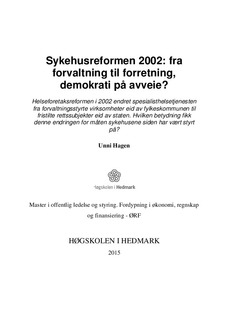| dc.contributor.author | Hagen, Unni | |
| dc.date.accessioned | 2015-04-23T08:09:14Z | |
| dc.date.available | 2015-04-23T08:09:14Z | |
| dc.date.issued | 2015 | |
| dc.identifier.uri | http://hdl.handle.net/11250/282336 | |
| dc.description | Dybdemaster, 120 poeng | nb_NO |
| dc.description.abstract | Den norske samfunnsmodellen er en suksess. Vi har de samme rettigheter gjennom et fin-masket velferdssystem vi alle bidrar til etter evne. Derfor har vi et høyt velferdsnivå med en god sykehusstruktur, høy barnehagedekning, utdanning for alle for å nevne noen av de viktige oppgavene vi står ansvarlig for i fellesskap. Men, de siste årenes ”modernisering” er i ferd med å endre det som er bygget opp systematisk og planmessig over mange tiår. Det er ikke gitt at utviklingen opprettholder de prinsipper vi har bygd vår samfunnsmodell på, og dette er noe av bakteppe for min avhandling. Vi lever i et av verdens rikeste land med de beste forutsetninger for å utvikle velferdsmodellen videre. Derfor er det et paradoks at vi i 2015 velger å stenge sykehusavdelinger for å spare, legge ned sykehjem fordi kommune-økonomien ikke strekker til eller legge ned lokalsykehus fordi det er mer ”lønnsomt” å sentralisere.
Tema i min avhandling er sykehussektoren. Gjennom å studere endringene fra forvaltnings-styring til forretningsstyring ville jeg finne ut om de kjente konsekvensene gir kritikerne rett i at nytt styringssystem har svekker demokratiet og politikernes styringsmulighet.
Er forretningsmodellen en hindring for politisk styring? Kan politisk styring over offentlig forvaltningsområder ivaretas når de områdene som skal forvaltes og styres frikobles fra forvaltningen? Min hypotese er at ved å frikoble sykehussektoren fra offentlig forvaltning og innføre bedriftsøkonomiske styringsmål og metoder framfor samfunnsøkonomiske svekkes den demokratiske styringen. Dette rokker ved verdigrunnlaget i den norske samfunns-modellen.
For å finne svar på hypotesen har jeg undersøkt hva som skjedde med politikernes mulighet til å planlegge og styre etter at sykehusreformen ble iverksatt i 2002. Jeg har valgt å bruke sammenslåingen av Oslosykehusene som case-studium. Konklusjonen er at helseforetaks-systemet, slik det framkommer i hovedstadsprosessen, ikke er vellykket. Bruk av forretningsprinsipper og ”profesjonelle” til å ivareta fellesskapsløsninger har ført til dårlig demokratisk kontroll, mangelfull planlegging og vist seg mer kostnadskrevende. Dette utfordrer verdigrunnlaget i den norske samfunnsmodellen. | nb_NO |
| dc.description.abstract | Engelsk sammendrag (abstract)
The norwegian social model is a success. We all have the same rights through a finely woven welfare system where we all contribute with the assets available to us. This is why we have a high level of welfare with a well functioning hospital structure, high kindergarden coverage, free education to all to name a few of the important tasks we are responsible for in our joint concern. However, with the recent years “modernization” is about to change what has been built systematically over decades. Therefore it is not given that the development maintains the principles that we have built our welfare model on, and this is part of the back-ground for my thesis. We live in one of the richest countries in the world with the best assumptions to continue to develop the welfare model on. Thus it is a paradox that we, in 2015 choose to close down hospital departments to save money, choose to shut down nursing homes because the municipal economy do not cover the costs, or make local hospitals close the doors because it is more “profitable” to centralize the operations.
The theme in my thesis is the hospital sector. Through studying the changes in the hospital sector from management controlled to business controlled I would see if the known consequences give the critics the right of the matter when they claim that the new management system has weakened the democracy and the politicians administration.
Is a business model a hindrance for political administration? Is it possible to govern public administration areas when the areas to be administered are cut loose from the administration? My hypothesis is that by separating the hospital sector from public governance and introducing commercially management objectives the democratic govern-ment is weakened. This shakes the foundations of the Norwegian welfare model.
To find the answer to my hypothesis I have looked at what happened with the politicians possibilities to plan and govern after the implementation of the hospital reform in 2002. I have chosen to use the merging of the Oslo hospitals as my case study. My conclusion is that the health system, as it appears in the capital process is unsuccessful. Use of commercial principles and “professional” to maintain public solutions has led to bad democratic control, deficient planning and proven itself to be more cost-intensive. This is a challenge against the foundation of the Norwegian welfare model. | |
| dc.language.iso | nob | nb_NO |
| dc.rights | Navngivelse-Ikkekommersiell-DelPåSammeVilkår 3.0 Norge | * |
| dc.rights.uri | http://creativecommons.org/licenses/by-nc-sa/3.0/no/ | * |
| dc.subject | helsereform | nb_NO |
| dc.subject | forretningsmodeller | nb_NO |
| dc.subject | sykehusadministrasjon | nb_NO |
| dc.subject | Oslo universitetssykehus | nb_NO |
| dc.subject | samhandlingsreform | nb_NO |
| dc.subject | modernisering | nb_NO |
| dc.subject | sentralisering | nb_NO |
| dc.title | Sykehusreformen 2002: fra forvaltning til forretning, demokrati på avveie? | nb_NO |
| dc.type | Master thesis | nb_NO |
| dc.subject.nsi | VDP::Social science: 200::Political science and organizational theory: 240::Public and private administration: 242 | nb_NO |
| dc.source.pagenumber | 108 | nb_NO |

